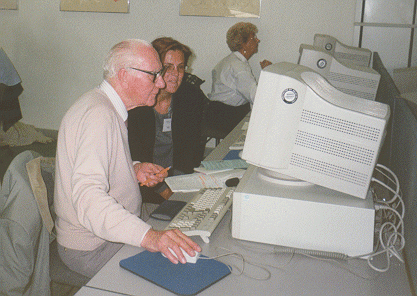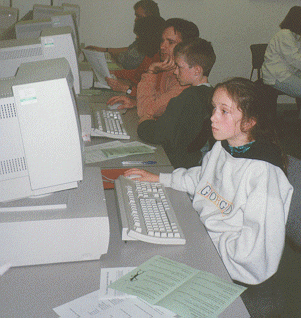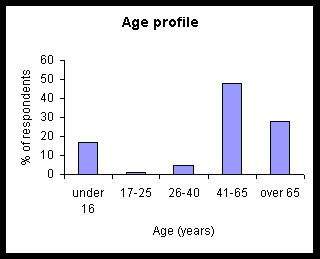Public Libraries Corner: An Internet Open Day
As the number of public libraries that offer Internet access, for their staff and/or the public increases, many libraries will be wanting to provide basic training for staff and the public that familiarise them with the World Wide Web. In many situations what is required is a training package that is flexible, that staff or members of the public can work through independently or in a group and that is relatively cheap to produce and administer. The recent report, New Library: The People’s Network [1] places great emphasis on the need for all public libraries to provide Internet access for the public and for all library staff to be competent in its use. If the proposals in the report are adopted, there will be a further incentive for public libraries to provide such a basic introduction.
In November of last year, UKOLN and the University of Bath [2] responded to National Libraries Week by devising such a programme for local councillors and the public. This article describes how the programme was put together and the Open Day that the University hosted at which the programme was used.
UKOLN and the University of Bath’s response to National Libraries Week was initiated by the University Librarian, Howard Nicholson, and Sarah Ormes, UKOLN’s public library networking researcher. The Librarian was keen that the public should get a chance to see and use some of the facilities available in the recently refurbished University Library and Learning Centre [3]. The Centre is open 24 hours a day and has 350 PC networked terminals with Internet access. Sarah Ormes, was a member of the Bath 1997 National Libraries Week working group, which included representatives from public, school and special libraries. The working group were particularly keen that any event planned around that Internet should give people that would not normal have the opportunity or the inclination to use the Internet, a chance to sample the World Wide Web. A project team from UKOLN (Sally Criddle, Sarah Ormes and Isobel Stark) and the Library and Learning Centre (Dan Holden and Jonathan Orford) organised the event with help from Bath University Computing Services [4] IT Trainer, Rosie Brown. Other staff from the Library and UKOLN provided support on the day.
Aim of the event
 In order to try and make the event appealing to those people that would not normally seek out the opportunity to use the Internet, we wanted to promote the event through the subjects that could be investigated on the WWW. We wanted to highlight that this would be an information finding event using the Internet – promoting the idea of the Internet as a tool rather then something to be used for it’s own sake. To achieve this we focused on particular groups of people and their information needs. The groups chosen were:
In order to try and make the event appealing to those people that would not normally seek out the opportunity to use the Internet, we wanted to promote the event through the subjects that could be investigated on the WWW. We wanted to highlight that this would be an information finding event using the Internet – promoting the idea of the Internet as a tool rather then something to be used for it’s own sake. To achieve this we focused on particular groups of people and their information needs. The groups chosen were:
Local Councillors
The public library was particularly keen that local councillors be specifically invited to an introductory session. It was felt to be important that councillors, particularly member of library committees, are aware of and understand the significance of the Internet in the context of public libraries. We also wanted to demonstrate to councillors the resources available on the WWW that could be of use to them in their work.
Family History Researchers
Anecdotal evidence suggests that older people make less use of the Internet than other age groups. Indeed, a study [5] conducted recently at Bath Central Library (when the Library provided public access to the Internet) found that only 5% of users of this Internet facility were 45 years and over, and none of the users, surveyed at random, were over 65 years.
In consultation with the local public library, we decided that Family History, a very well used section of the local libraries, was an area that would particularly appeal to older people.
Parents helping their children with homework/school projects
Many parents are introduced to IT and the Internet through their children. IT is an established part of the National Curriculum and the Government has made a number of statements to suggest that they aim to enable all schools to have a connection to the Internet [6]. Many children are using computers and the Internet in schools and public libraries already and helping their children use the home or local library computer to complete homework and projects is often a way into IT for parents.
Materials
We wanted to demonstrate the diversity of resources available on the WWW, from local to international information, to show people material that was relevant to their information needs and to dispel myths about the Internet only being for ‘techies’. Rather than let people loose in the vastness that is cyberspace, we selected 20-30 sites for each subject area. We were looking for attractive, easy to navigate sites that contained useful and relevant information. Web sites selected as examples of Family History sites included:
- The web site of the UK Public Record Office [7].
- Familia: a web-based directory of family history resources available in UK public libraries [8].
- Pier 21: a Canadian project of archive materials and personal reminiscences of people who entered and left this important port in Nova Scotia during WWII [9].
In order to give people a more structured introduction to the WWW a number of questions were devised for each web site. To answer the questions people would have to explore the site in-depth and for a reason. This avoided directionless ‘surfing’ and showed that the web can be used to find specific pieces of information. Separate web pages were produced for each session with each page listing the resources that had been selected. The questions were produced as an A5 handout.
Posters and tickets for the event were produced in house, using PowerPoint. As well as the event being advertised in the local public libraries, the Bath 1997 National Libraries Week working group produced a brochure listing all the local events that were planned for the week. This was delivered to all households in the area and was published in the local newspaper, the Bath Chronicle. As we had to limit the number of people we could accommodate in the Library and Learning Centre, the Central Library in Bath issued tickets, free of charge, on a first come first served basis.
Structure of the day
Four separate sessions were held during the day, each lasting for 90 minutes. As well as the three subject areas already described, we ran a session entitled “Around the Internet in 90 minutes” which looked at resources of general interest such as current affairs, music, gardening and food and drink. Each session was lead by a different member of the project group. We were able to use 50 terminals in an area of the Library that could be cordoned off.
As the computing/Internet experience of the people attending varied greatly, each session began with the University’s IT trainer giving a short introduction on using the terminals and a basic description of the Internet. An A5 handout “The Internet and the World Wide Web” was also produced and given to all participants, which provided a little more background to the Internet/WWW.
After the general introduction, the leader of each session gave a short presentation describing how the materials could be used as an introduction to the WWW.
 The sessions proceeded with people either following the questions devised or if they chose, roaming freely around the WWW. Most sessions had a ratio of about four members of the public to one member of staff to ensure that help was readily available for those that required it. Everyone taking part in the sessions was asked to complete a questionnaire that asked about previous Internet experience, opinions of the event and issues related to the Internet and public libraries. Participants could take the handouts away with them at the end of the session.
The sessions proceeded with people either following the questions devised or if they chose, roaming freely around the WWW. Most sessions had a ratio of about four members of the public to one member of staff to ensure that help was readily available for those that required it. Everyone taking part in the sessions was asked to complete a questionnaire that asked about previous Internet experience, opinions of the event and issues related to the Internet and public libraries. Participants could take the handouts away with them at the end of the session.
Practical arrangements
All local councillors were personally invited to their session by the University Librarian Entry to the public sessions was by ticket only, which were available from the central public library. No charge was made for these. The only restriction made was that anyone under 16 had to be accompanied by an adult. People were offered a tour of the Library and Learning Centre after each session.
In preparing the event, we had liased closely with Bath University Computing Services staff to ensure that we had taken as many steps as we could to ensure that we could illuminate as many potential technical problems as possible. For example, at the beginning of the event, the terminals were set with our Internet Open Day web site as the home page so that if people got lost during the sessions, clicking on the home button would return them to a familiar page. Before each session, all WWW links were cached to the local University store to ensure that links would be as quick as possible. We did prepare for the unlikely, but not inconceivable event, that a serious technical problem on the day meant that we were unable to use the terminals at all. Short presentations were prepared in which the selected web sites would be talked about and illustrated with screen shots of the pages.
The Day
Despite the threat of high winds and torrential rain, on Saturday 6th November, over 150 people made the trip up the hill to the University during the day, which passed without major technical hitches. The Family History session was particularly successful in attracting people from an older age range with little experience of computers – our target group. Disappointingly, only four local councillors attended. Informal feedback from the participants was very encouraging and a studious hum and tapping of keyboards was all that could be heard during most of the day’s sessions as people were enthralled by what they were finding.
 Questionnaire results
Questionnaire results
From the questionnaires that were completed, 76% of people attending were 41 years of age or over and an encouraging 28% were over 65 years. About a half (56%) had never used the Internet before, but all would use it again.
Everyone questioned felt that public libraries should provide Internet access and 77% would be willing to pay up to £5 an hour to use it. However, the fact that 86% of people said that they would pay £5 more tax a year to enable this does somewhat cast a shadow of doubt over these statistics!
Many positive comments were made on the questionnaires, including:
- Really great to hold this sort of event
- I wish we had an “Internet consultant” at the local library
- Very grateful for the opportunity
- Easier and quicker than I thought
- Good opportunity for families to learn together
- A very angst free introduction
- Training site was very helpful/interesting
- Entry to a new world, excellent!
- I have crossed a barrier and found this session very interesting.
- Very helpful staff, good opportunity to involve people who hadn’t tried before.
The Library Association nominated the event as one of the twelve most innovative activities of National Libraries Week.
Conclusion
All the staff involved in the event felt it a very worthwhile experience. We were particularly pleased that so many of the people taking part in the sessions had little or no experience of IT and that the vast majority of them enjoyed their new experience. It was disappointing that we did not attract more local councillors. It could have just been that they could not afford the time, but if it was due to lack of interest it does suggests that public libraries have much work to do in persuading councillors of the value of public access Internet connections.
Another interesting observation was that the group who were most easily bored by the exercises were some of the younger children, who were more interested in playing games than exploring the web sites in the programme.
We did not have a budget for producing the materials and organising the Open Day, so materials had to be produced in house and printed using a laser printer. The materials were produced inexpensively and quickly – all the printing being done on the office laser printer.
As well as providing a well attended and valued contribution to Bath’s National Library Week programme, this event provided the opportunity to demonstrate how a flexible training package can be produced and delivered inexpensively.
Materials available
The original web page that was produced for the Internet Open Day is available on the UKOLN server [10]. Other materials produced for the event, questions, “Introducing the Internet and WWW” handout, the poster and tickets are available as Word and PowerPoint documents and can also be downloaded from UKOLN’s website [11].
These materials are being incorporated in a New Library: The People’s Network briefing pack produced by UKOLN in conjunction with the Library Association [12] and EARL [13] that will be distributed to all library authorities soon.
Notes
UKOLN provides research, awareness and information services in the area of network information management. It is supporting the emergence of viable digital information environments, and works to influence practice and policy through a range of activities and publications.
UKOLN is funded by the British Library Research and Innovation Centre, the Joint Information Systems Committee of the Higher Education Funding Councils, as well as by project funding from the JISC’s Electronic Libraries Programme and the European Union. UKOLN also receives support from the University of Bath where it is based.
References
[1] Library and Information Commission. New Library: The People’s Network [online]
Place of Publication: UKOLN
Available from http://www.ukoln.ac.uk/services/lic/newlibrary/ [March 6th 1998]
[2] University of Bath
http://www.bath.ac.uk/ [March 6th 1998]
[3] University of Bath Library and Learning Centre
http://www.bath.ac.uk/Library/ [March 6th 1998]
[4] University of Bath Computing Services
http://www.bath.ac.uk/BUCS/ [March 6th 1998]
[5] Criddle, S. L., 1997 A Study of Internet Use in a Public Library. MSc dissertation (unpublished).
[6] Connecting the Learning Society: The Government’s consultation paper on the National Grid for Learning.
Owner/Maintainer: Department for Education and Employment
Available from http://www.open.gov.uk/dfee/grid/index.htm [March 6th 1998]
[7] UK Public Record Office
http://www.open.gov.uk/pro/prohome.htm[March 6th 1998]
[8] Familia
http://www.earl.org.uk/familia/index.html [March 6th 1998]
[9] Pier 21
http://www.pier21.ns.ca/ [March 6th 1998]
[10] Internet Open Day Web pages
http://hosted.ukoln.ac.uk/libweb/nlw97/internet-day/ [March 6th 1998]
[11] Internet Open Day Printed Materials
http://www.ukoln.ac.uk/publib/intro2.html [March 6th 1998]
[12] Library Association
http://www.la-hq.org.uk/ [March 6th 1998]
[13] EARL
http://www.earl.org.uk/ [March 6th 1998]
Author Details
Sally CriddleResource Co-ordinator
UKOLN
s.criddle@ukoln.ac.uk
